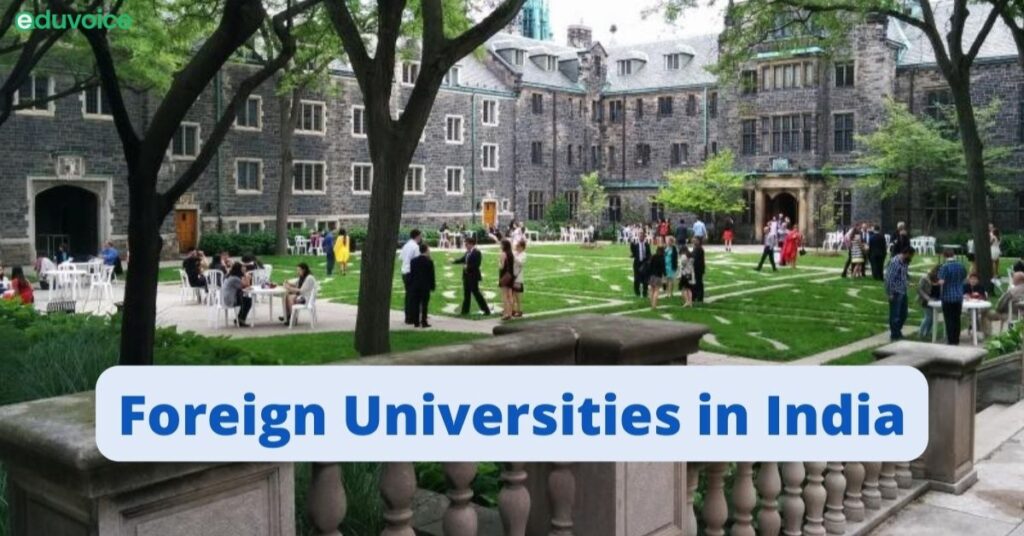These days, many students want to go overseas to seek high-quality higher education. But we also know the burden of taking education loans as well as the emotional struggle of moving to a different country, away from your family. What if we told you there’s a way out — you can study on foreign campuses without leaving your homeland? That too at almost half the cost.
This is soon going to become a reality for Indian students.
On January 5, the University Grants Commission (UGC) unveiled draft norms to facilitate the “Setting Up and Operation of Campuses of Foreign Higher Educational Institutions in India”. In other words, India is bracing itself to accommodate offshore campuses of some of the top globally ranked universities. According to the guidelines laid down in the draft, these universities will have absolute autonomy in deciding the fee structure, administering the admission process, and repatriating their funds back home.
Speaking at a press conference, UGC Chairperson M Jagadesh Kumar said: “The new National Education Policy (NEP), 2020, has envisioned that top universities in the world will be facilitated to operate in India. For this, a legislative framework facilitating such entry will be put in place, and such universities will be given special dispensation regarding regulatory, governance, and content norms on a par with other autonomous institutions of India.”
To put things into perspective, here are some key points from the draft:
- These campuses will have the freedom to design their own admission process as well as the criteria to invite domestic and foreign students
- These foreign entities can decide the fee structure but it needs to be “reasonable and transparent”
They have no restrictions in recruiting staff and faculty from India and abroad
These campuses cannot offer online or distance learning courses
The qualifications awarded to Indian students must be equivalent to those offered by renowned foreign institutions in their own country
Every foreign education institution will be allowed cross-border movement of funds and maintenance of foreign currency accounts, mode or payments, remittance repatriation and sale of proceeds, under the Foreign Exchange Management Act (FEMA), 1999 - The initial approval for these campuses will be for 10 years and will be renewed in the ninth year. Moreover, these universities cannot offer courses that might put national interests in jeopardy
Now, just a month and a few days since the draft was released, Union Minister of Education Dharmendra Pradhan announced that “Two Australian universities will be establishing their campuses in the GIFT City in Gujarat. We want to partner with Australia with accessibility, affordability, and quality of education for youngsters”.
Australia’s Deakin and Wollongong are the two varsities that will set up their offshore campuses in India’s Gujarat International Finance Tec(GIFT) City. While Wollongong has garnered a great reputation for being the first foreign university to open a campus in the UAE, Deakin ranked 266 in the QS World University Rankings and is also among the top 50 young universities in the world. Also, it is important to note that Deakin has picked India to open its first offshore campus in the world. Clearly, India is doing something right in terms of bolstering its economic growth and initiating a futuristic transformation of its education sector.
In fact, here is how this can turn out to be a blessing for India and its students:
- No need to move abroad, opportunities will now come to you – Instead of dipping into parents’ lifetime savings or taking massive loans to join a foreign university, students will be able to access quality education and technologically advanced learning tools at a much lower cost, and without stepping outside the country. And let’s not forget how earning a degree, indulging in exchange programmes, and gaining fine skills and knowledge from a renowned international university will open several doors for young Indians.
- A myriad of options for students – The consistent struggle to earn a seat in top Indian universities despite impressive scores will also reduce. With these offshore campuses, the students will have a broader range of options to choose from. Besides, this wave of foreign campuses will force the existing universities to step up their game and offer courses that focus more on modern-day practical knowledge than age-old theoretical learning.
- A boost to the economy – Yes, we are on our way to becoming the third-largest economy in the world by the end of 2030. But for that, we need a consistent supply of skilled youth. Often, students go abroad to seek premium quality higher education but never return, which causes a huge loss to the Indian economy in terms of revenue as well as skilled manpower. According to recent reports, India is leading the way for emigrant unicorn founders. Through this amalgamation of international standards of learning with the Indian education system, the youth will be nurtured better and be offered the needed exposure within the country. And sure, we can expect more Indian unicorns in the coming years.
While the decision to welcome foreign campuses ignites hope for a brighter future for the Indian education system, some educators have reservations about this move. They view it as a potential “harm” to the Indian education system and say it will only result in the commercialization of education.
Success or failure, it’s hard to predict the future of this policy today. But what’s harder is to not see the Indian education system reaching greater heights in the current era.
For us to become the most sought-after destination for education, implementation of this policy seems like the next logical step. However, let’s also understand that the execution of such impactful decisions takes time, and they better do so in order to avoid any serious conflicts or disagreements at a later stage.
For More Such Articles, News Update, Events, and Many More Click Here






